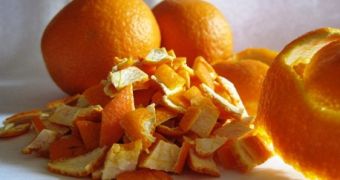A new project set to prove that orange peels could be used to power our cars is currently underway at the University of York, under the guidance of Professor James Clark.
The British scientist has reportedly come up with a revolutionary method of producing biofuels. Dubbed OPEC (Orange Peel Exploitation Company), the project will bring together researchers from York, the University of Sao Paulo, Brazil and the University of Cordoba, Spain.
It looks like orange peels could be processed via microwaves to release gases that could be then collected to produce oil, plastics, chemicals and even fuels.
Naturally, if this whole process was to be replicated on an industrial scale, a wide range of plant-based waste could be used to produce fuel. We could use cashew nut shells, apple peel, coffee grounds, to name but a few.
“Waste orange peel is an excellent example of a wasted resource. In Brazil, the world’s largest producer of orange juice, half the orange fruit is left as waste once the juice has been recovered. This corresponds to eight million tons a year of orange peel that can be used to produce chemicals, materials and fuels,” explained Professor Clark.
The team behind the project is confident this new technique could hugely benefit the economy of any country that chooses to use it.
“Waste is a problem worldwide. Food residues and by-products are being generated in very significant quantities by the food industry and the agricultural sector. Though they are sometimes used in low-value applications, they are often landfilled, which is economically and socially unacceptable as well as representing a major loss of resource,” Professor Clark added.
“The increasing demand for renewable feedstocks is encouraging the re-use of organic waste from the food supply chain for the production of novel added-value materials, chemicals and fuels,” he concluded.

 14 DAY TRIAL //
14 DAY TRIAL //